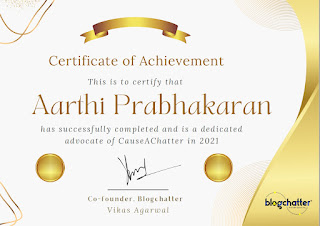Last year, 2021, I signed up for #CauseAChatter, when I was told by Team Blogchatter that most of my blogs submitted under blogrolls qualify for the same. I stuck with the programme all through the year. Come 2022, January brought with it some great changes and some not so great ones as well. The first great thing was the certificate for being part of the CauseAChatter for 2021.
I have been offered a job in a start-up overseeing their HR operations, which is a huge thing for someone who has had a very non-traditional career path. I also decided that I wanted to pursue Masters (Post Graduation) now, 2+ decades after I completed my undergraduate studies. I was really hoping that the COVID situation will ease out with some semblance of normalcy returning into our lives.
Unfortunately, Omicron
seemed to have a different idea altogether. Slowly cases are rising which has
brought online schools back in full force. Even the glimmer hope that a form
asking parental consent on sending older children to regular offline school
just got squashed. 2+ years of online school, work from home (WFH) alternating
between with and without domestic help, based on the circumstances, have had
their toll on my mental health.
I was curious to know if I was the only one facing burnout and talked to some friends and found that many were going through a similar phase. It got me thinking. Here are some things that I deduced from my discussions with peers and friends on what contributes to this burnout:
- Stunted Social Life: Restricted movements and the social distancing protocols of COVID appropriate behaviour leaves us all stuck indoors with just our family, and a few friends/neighbours who live close by our place. This is even more so when we are not in a financially privileged position to hire a private transport from our place to someone else’s place far from home.
- Stunted Vacations: Vacations are the time to unwind. Irrespective of ones’ financial prowess, we would have one family vacation at least every 2 years away from our place of residence to enjoy the few days of change of routines or the lack of it, excitement of exploring a new place (small village or huge city), or just a change of scenery to break the monotony of life. Unfortunately, this hasn’t been possible for obvious reasons.
- Virtual Workplaces: While there are benefits of virtual workspaces that help in keeping the continuity of work and by extension, business, and economics, it is still not an option for all. Also, the virtual workspace, I think is stunted as well, especially with respect to human interactions as it lacks the decorum that an actual workplace can provide.
- Stunted Learning for Children: Children thrive with social interactions that involve all their senses. Online learning has them glued to the screens and a chair with no friend close by to snicker or bicker. The attention span that was already very low, to begin with has become almost negligible due to the monotony of the online classrooms.
- Lack of personal time and space for primary care givers: For homemakers like me who hustle between homemaker and consultant/businesswomen at our convenience (read when the rest of the family is out and about, away from home), the pandemic lifestyle has been the toughest, catering to the demands of the family bringing order among the chaos that COVID brought into the daily routines by completely throwing it off track. Despite the repeated reassurance given by experts that the pandemic will soon move into the endemic mode, the light at the end of the tunnel is still not visible, especially considering the lack of change in human behaviour that is exhibited by leaders and common people alike.
Usually, when I write,
I like to make sure that I also give a few pointers on how to address the
issue at hand. While I
do know I can give some, for the above-stated problem too, I am not sure they
are enough to address the problem of burnout that people like me (Indian women,
who are the unopposed primary caregivers with no choice to play the role of a
secondary caregiver) are going through. And this burnout is not restricted to just people like me. It has affected every individual irrespective of age, gender, economic status and other such associated identifiers. The online space is also not safe
enough to discuss our issues and vulnerabilities without a troll or a few
dropping in and adding to our already overflowing basket of woes. With such a
bleak picture, a deep sigh escapes me more often than usual and I find myself
wishing fervently for the end to be near, for everyone's sake.
The need for safe
spaces for everyone to be able to share their vulnerabilities, pain points, and
frustrations has become a priority. Unfortunately, as a race, we humans have
still, not even taken the first step to understanding ourselves and the biases that
drive our behaviours and life choices. We are a long way from creating such
safe spaces for healthy sharing and the probable start of beneficial discussions
that can initiate a change.
I believe that
miracles are a result of small intentional actions that would eventually drive
a tsunami-like shift in our behavioural patterns, that feels like a miracle. Let
us all together pledge to do our share of small intentional actions such as
being self-aware, observing what is happening around us, and acting when we see
someone in need of a break at least when they ask for it, shifting our focus from
excellence to consistent progress (even is student performance – as parents and
educators), and more.
Do share your thoughts
on what other small intentional actions can bring about the tsunami-like wave
that looks like a miracle?
This blog is part of Blogchatter’s #CauseAChatter challenge, #MentalHealth, #Discrimination, #AccessToEducation.

No comments:
Post a Comment